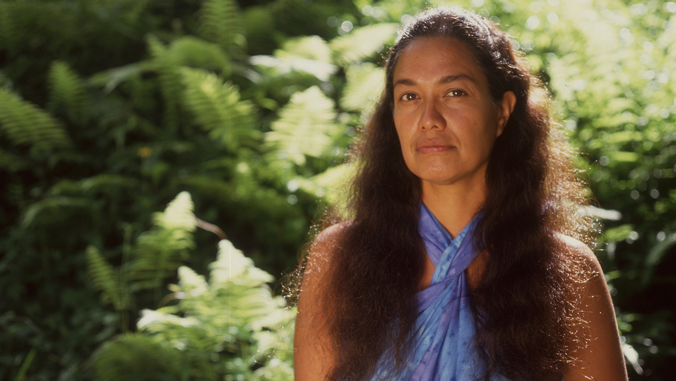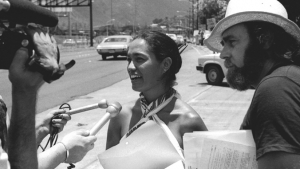
Retired University of Hawaiʻi at Mānoa Professor Haunani-Kay Trask was awarded the 2019 Angela Y. Davis Prize by the American Studies Association (ASA) on November 7, at the annual ASA national conference in Honolulu, Hawaiʻi. Founded in 1951, ASA is the oldest American studies association and the largest, with 5,000 members worldwide. The honor recognizes scholars who have applied or used their scholarship for the public good. It’s namesake, Angela Davis, is a prominent black feminist writer, activist and critical voice in black freedom struggles.
“I see the prize as symbolizing the comradeship and the solidarity and the way in which we have worked as a community, so I am the one who is proud that Haunani was chosen to receive the award,” said Davis after Trask was honored. “I think it’s up to me, as well as all of us, to live up to the legacy that she has forged.”
July 3, 2021: In memoriam: Haunani-Kay Trask, exemplary Native Hawaiian scholar
For nearly four decades, through her extensive academic work and activism, Trask has been a critical voice in what she called, “the modern Hawaiian movement” and the broader Hawaiian sovereignty movement. She burst onto Hawaiʻi’s political scene in the late 1970s. Throughout her career she advocated for issues such as resisting gender-based violence against women and supporting indigenous nations; the relationships between indigenous peoples, particularly Native Hawaiians, and the United States; and women’s leadership in the Hawaiian movement. She is credited with co-founding the contemporary field of Hawaiian studies and battling against gender and racial biases to secure tenure at UH Mānoa. Trask ultimately served as a tenured member of the UH faculty for more than 30 years and was the founding director of the UH Mānoa Center for Hawaiian Studies.
“Haunani-Kay Trask is arguably the most prominent and influential indigenous Hawaiian scholar of the 20th century and beginning of the 21st century,” UH Mānoa Political Science Chair Noelani Goodyear-Kaʻōpua and UH Mānoa College of Education Professor Erin Kahunawaikaʻala Wright wrote in the nomination for the Angela Davis Prize. “Her legacy of activism, artistry and scholarship continues to stoke the flames of new generations of indigenous scholars and organizers.”
Accomplished activist

Born and raised in Hawaiʻi, Trask attended the University of Wisconsin in the 1960s during the height of the Vietnam War where, as a graduate student, she fought to have women’s studies and feminist theory courses included as part of the campus curriculum.
Her accomplishments are too numerous to list, but include famously challenging white male anthropologists who claimed authority to speak and write about cultural and political movements in Hawaiʻi and Oceania and becoming involved in land struggles on Oʻahu. She opposed the evictions of Hawaiians from Sand Island, the development of Heʻeia wetlands near her childhood home and the gentrification of Waimānalo. She argued that these were “ceded lands” that should belong to a sovereign Hawaiian national government.
Trask’s academic work on these issues and more include books of theory and poetry; a television series; an award-winning documentary film; political oratory; countless op-ed and review essays; educational program-building and more.
“Trask’s published writings and body of activist work demonstrate the ways she saw art as political and politics as art, what she called a ‘confluence of creativities,’ in the context of movements against intersecting structures of racism, sexism, colonialism and imperialism,” wrote Goodyear-Kaʻōpua and Wright. “A poet, political theorist, community leader, and international advocate for Indigenous peoples, anti-racism, smashing patriarchy, and human rights, the breadth of Trask’s intellectual production spans multiple genres, written and spoken.”
Her academic work, theories and life are being taught now and will be for generations to come.
Trask was unable to attend the award ceremony. Her long time partner, UH Mānoa American Studies Professor David Stannard, accepted the award on her behalf. The David E. Stannard and Haunani-Kay Trask Endowed Scholarship in American Studies has been established to support American studies students at UH Mānoa with a research focus on indigenous and/or Pacific Island studies.

